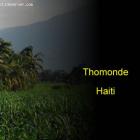Haiti Agricultural Facts, land and environment
ADVERTISEMENT
Haiti's agriculture sector is one of its largest, and should be the mainstay of the country's economy, but many factors, historical, social, political, and environmental have undermined its ability to thrive. Haiti at one time was the #1 exporter of coffee, and also exported enormous amounts of sugar cane. Global competition in both areas priced them out of the market.
Exporting countries have taken advantage of Haiti by selling them commodities like rice at cheap prices, so they had less incentive to produce it themselves. Becoming dependent on exports, they now had to pay whatever the prevailing price was.
New food assistance programs beneficial to agriculture are happening. The Global Health and Food Security Initiative is working with Haitian farmers to improve their farming methods. And to deal with food insecurity the U.S. Agency for International Development has given $47.5 million to NGOs.
The UN Environment Program is working with environmental degradation in Haiti. Their Improved Stoves Network is about building and learning to use fuel-efficient stoves. To quote from "Recovery and Agriculture in Haiti": "With improved governmental capacity and accountability, a strong network of partnerships with regional, international and NGO partners, and a coordinated effort to rehabilitate the environment, progress is possible."
Read more: Agriculture, Land, Agriculture and Food
« Making the Famous Haitian Griot on Thanksgiving Day | Main | Marriott an engine for Locally Made Goods in Haiti »
Leave a Reply
Name (required) E-mail (required, will not be published)
» »
Our objective is to share with you news and information about Haiti and the people of Haiti. Traditions, habits and the way we were or grew are alive in this site. We highly recommend that you Subscribe to our Newsletter and also share with us some of the things that are memorable and made us unique people.


 Haiti tech Summit
Haiti tech Summit  Thomonde, Haiti
Thomonde, Haiti  Life After Death
Life After Death  Battle of Vertieres
Battle of Vertieres  Informative Marketing and Advertising in the Haitian Community
Informative Marketing and Advertising in the Haitian Community